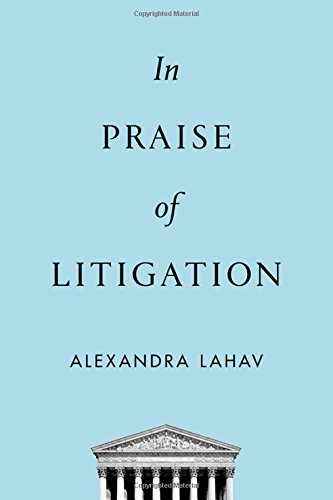

Most ebook files are in PDF format, so you can easily read them using various software such as Foxit Reader or directly on the Google Chrome browser.
Some ebook files are released by publishers in other formats such as .awz, .mobi, .epub, .fb2, etc. You may need to install specific software to read these formats on mobile/PC, such as Calibre.
Please read the tutorial at this link: https://ebookbell.com/faq
We offer FREE conversion to the popular formats you request; however, this may take some time. Therefore, right after payment, please email us, and we will try to provide the service as quickly as possible.
For some exceptional file formats or broken links (if any), please refrain from opening any disputes. Instead, email us first, and we will try to assist within a maximum of 6 hours.
EbookBell Team

4.4
82 reviewsDoes litigation provide any social benefits at all? Certainly, it is expensive, stressful and time consuming, but Alexandra Lahav contends that the critics have blinded us to its many benefits. In Praise of Litigation explains what society gains from litigation and why it is ultimately a social good. Our ability to go to court is a sign of our strength as a society and enables us to both participate in and reinforce the rule of law. Joining lawsuits also gives citizens direct access to governmental officials - judges - who can hear their arguments about issues central to our democracy, such as the extent of police power and the ability of all people to vote. Litigation also promotes equality before the law, transparency, and accountability. And it is at least arguable that lawsuits have helped spur major social changes in arenas like race relations and marriage rights, as well as made products safer and forced wrongdoers to answer for their conduct. In her defense of the system, Lahav does not ignore the many costs that litigation imposes, and proposes a number of sensible reforms that improve the value of litigation. Many of the proposals that have been adopted and are currently on the table are spurious because they solve problems that do not exist or just make it harder for citizens to defend their rights and to enforce the law --
"[This book] provides a much needed corrective to this flawed perspective [that the United States is hopelessly litigious], reminding us of the irreplaceable role of litigation in a well-functioning democracy and debunking many of the myths that cloud our understanding of this role. For example, the vast majority of lawsuits in the United States are based on contract claims, the median value of lawsuits is on a downward trend, and, on a per capita basis, many fewer lawsuits are filed today than were filed in the 19th century. Exploring cases involving freedom of speech, foodborne illness, defective cars, business competition, and more, the book shows that despite its inevitable limitations, litigation empowers citizens to challenge the most powerful public and private interests and hold them accountable for their actions. Lawsuits change behavior, provide information to consumers and citizens, promote deliberation, and express society's views on equality and its most treasured values. [This book] shows how our court system protects our liberties and enables civil society to flourish, and serves as a powerful reminder of why we need to protect people's ability to use it." -- Publisher's website/book jacket.